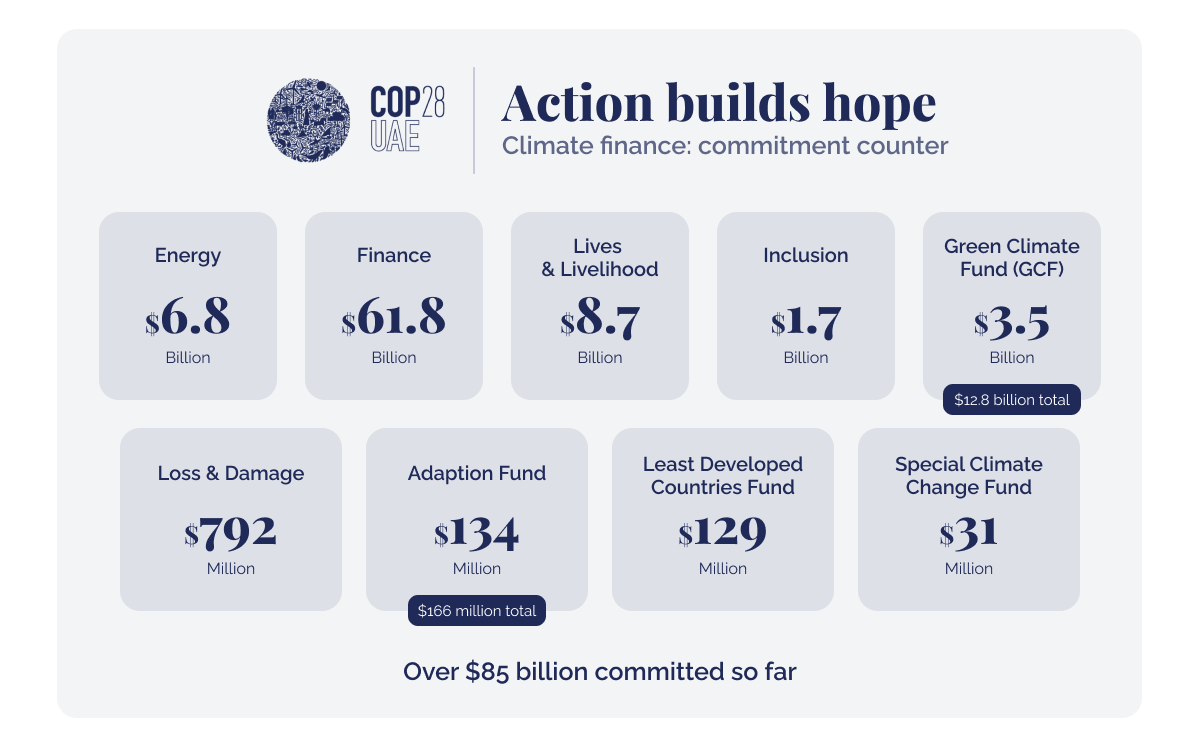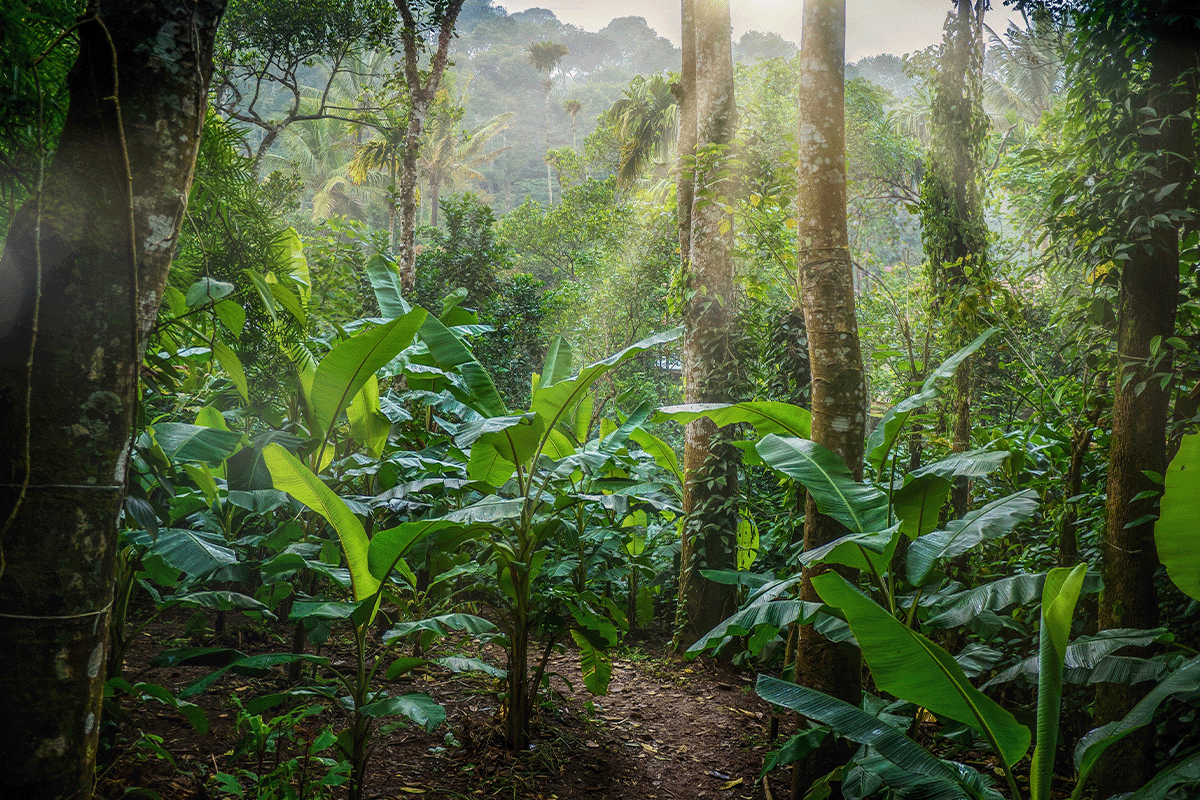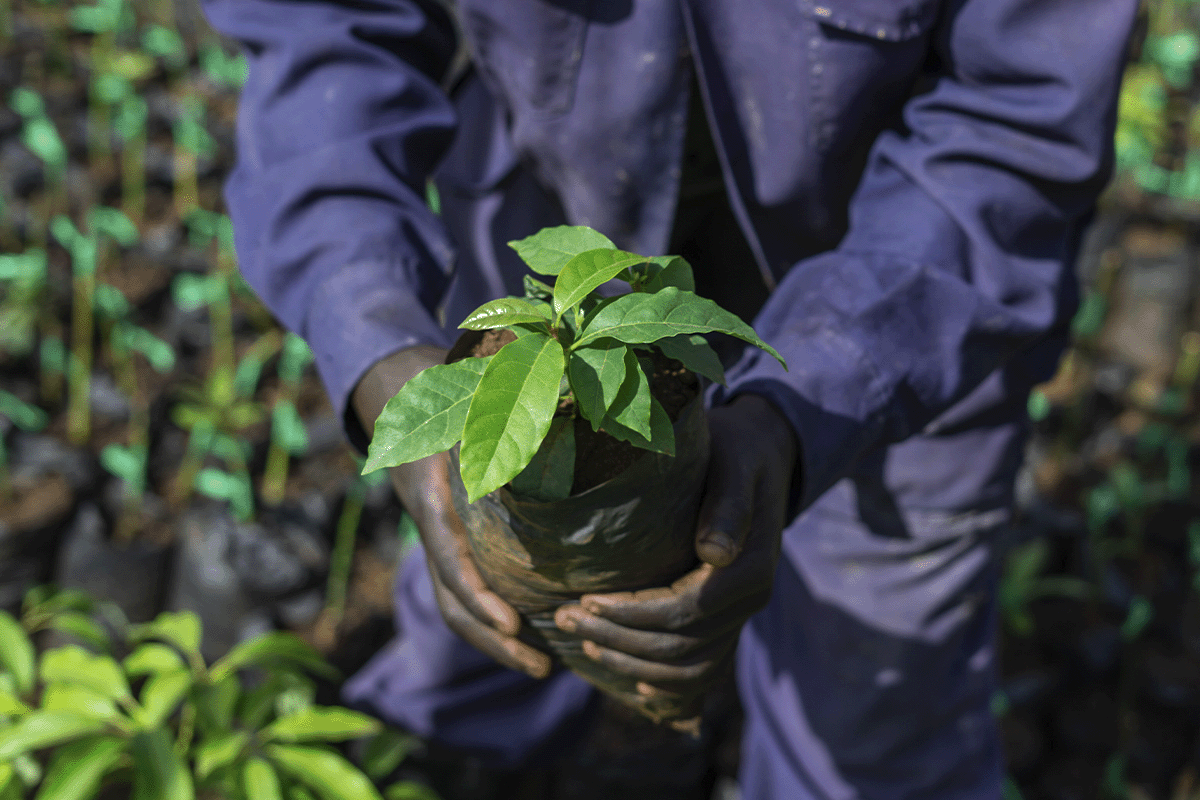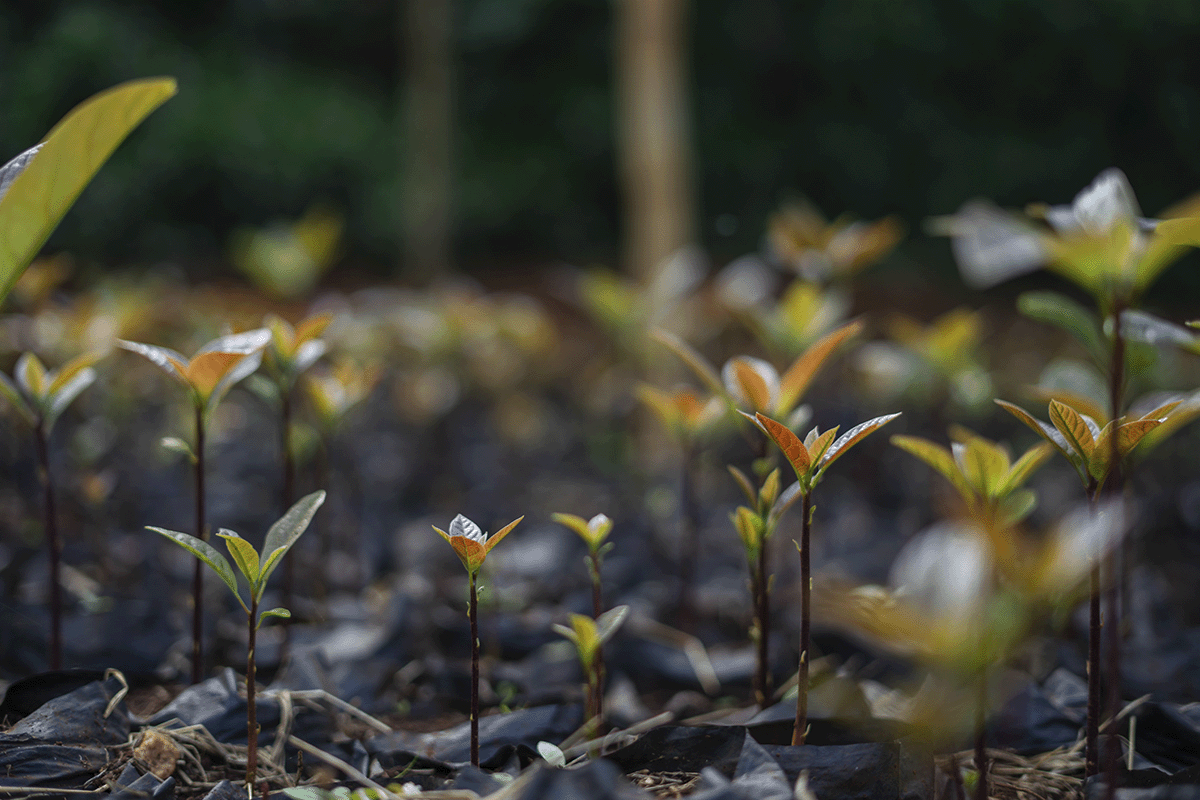Following the recently concluded COP28, the 28th session of the Conference of the Parties (COP) to the United Nations Framework Convention on Climate Change, our blog embarks on a journey to unravel the pivotal moments and significant achievements that transpired during this momentous event. Held against the backdrop of the vibrant city of Dubai, United Arab Emirates, from 30 November to 12 December 2023, COP28 served as the global nexus for deliberations on pressing environmental issues.
 View of Dubai Marina skyscrapers near a bay.
View of Dubai Marina skyscrapers near a bay.
As we delve into the highlights of this conference, we aim to provide a comprehensive insight into the discussions, agreements, and initiatives that emerged, shaping the trajectory of international efforts towards a sustainable and resilient future. Join us in exploring the key outcomes and noteworthy contributions that defined COP28 and continue to influence the discourse on environmental conservation and nature-positive action.
 Climate finance: commitment counter. Source: https://www.cop28.com/en/
Climate finance: commitment counter. Source: https://www.cop28.com/en/
What is COP?
The Conference of the Parties, commonly known as COP, stands as the linchpin of global climate governance, orchestrating annual gatherings under the United Nations Framework Convention on Climate Change (UNFCCC). These conferences, known as COPs, manifest as a paramount global platform where nations converge to engage in multilateral decision-making on environment-related matters. The significance of COPs lies in their role as a crucible for devising strategies to combat ever-pressing environmental crises.
Annually convened COPs boast nearly universal participation, with 197 countries worldwide actively involved in shaping the discourse on environmental action. These conferences represent a critical juncture where nations collaborate to establish objectives that span a wide spectrum of nature-related goals.
.png?width=1920&height=1080&name=Decoding%20COP28_%20a%20global%20odyssey%20for%20environmental%20solutions_The%20map%20showing%20countries%20that%20have%20signed%20the%20Paris%20Agreement_visual%203%20(1).png) The map showing countries that have signed the Paris Agreement.
The map showing countries that have signed the Paris Agreement.
Central to the discussions are objectives that resonate with the urgency of environmental crises. Key among these is the commitment to constraining the global temperature increase to 1.5°C. This target reflects the international community's collective determination to mitigate the adverse effects of environmental instability. Additionally, COP's focus is on facilitating the adaptation of vulnerable communities to environmental shifts, recognising the need for inclusive strategies to address the disproportionate burden of certain populations.
A pivotal long-term goal is the commitment to achieving net-zero emissions by 2050. This underscores the recognition that sustained efforts are essential to curtail carbon emissions and transition towards a carbon-neutral future.
Central to COP discussions is the Paris Agreement, a landmark accord adopted at COP21 in 2015. The agreement represents a global commitment to limit environmental emergencies, enhance resilience to nature-related impacts, and facilitate financial and technological support for developing nations. Its significance lies in providing a framework for collaborative action, with each participating country setting and regularly reporting on its targets.
The recently concluded COP28, hosted in Dubai, marked the 28th meeting of the Conference of the Parties. With a projected attendance exceeding 70,000 delegates, the event drew representatives from UNFCCC member states, known as Parties. Beyond governmental entities, participants included a diverse spectrum of stakeholders, encompassing business leaders, youth representatives, climate scientists, Indigenous peoples, journalists, and other experts.
.png?width=1200&height=800&name=Decoding%20COP28_%20a%20global%20odyssey%20for%20environmental%20solutions_World%20leaders%20in%20Dubai%20during%20the%2028th%20United%20Nations%20climate%20change%20conference_visual%204%20(1).png) World leaders in Dubai, United Arab Emirates, for the world climate action summit to kick off the 28th United Nations Climate Change Conference (COP28). Source: https://www.consilium.europa.eu/en/meetings/international-summit/2023/12/01-02/
World leaders in Dubai, United Arab Emirates, for the world climate action summit to kick off the 28th United Nations Climate Change Conference (COP28). Source: https://www.consilium.europa.eu/en/meetings/international-summit/2023/12/01-02/
Dubai's unique backdrop provided an inspiring setting for discussions and negotiations, serving as the stage for advancing global efforts in environmental action. As COP28 concluded, its outcomes and agreements are set to shape the trajectory of international endeavours towards a sustainable and resilient future.
From the beginning of COP21 to the conclusion of COP28, a span of 2,934 days, significant progress has been made. The Verified Carbon Market has achieved over 1.4 billion tonnes in verified emissions reductions and removals. It has also safeguarded over 10 million hectares of endangered forests.
In the subsequent sections of this blog, we delve into the highlights of COP28, unravelling the intricacies of the discussions that unfolded during this momentous event.
Read more: COP28 wrapped up: navigating environmental commitments
Historic milestone: COP28 to establish Loss and Damage Fund
In a historic accord at COP28's onset, delegates formalised the creation of a Loss and Damage Fund to support vulnerable nations grappling with the impacts of environmental challenges. This landmark decision on the conference's first day signals a collective effort to address the urgent needs of various countries that bear the disproportionate burden of environment-induced challenges such as floods, droughts, and rising sea levels.
Crucially, developed nations, including the United Arab Emirates, Germany, the United States, and others, have pledged financial contributions to the fund. The United Arab Emirates, with Minister Sultan Ahmed al-Jaber as COP28's president, has committed $100 million, while Germany and the European Union pledged $100 million and $245.39 million, respectively. This financial commitment, though significant, is recognised as just one part of the comprehensive solution required to tackle the complexities of loss and damage.
Read more: The importance of carbon offsetting in achieving net zero
Simon Stiell, the executive secretary for the United Nations Framework Convention on Climate Change (UNFCCC), praised the news, emphasising the momentum gained on the critical issue of loss and damage. He urged all governments and negotiators to build on this momentum, delivering ambitious outcomes throughout the COP28 proceedings.
Empowering environmental stewardship: unveiling the Green Credit Initiative
India’s Prime Minister Narendra Modi unveiled the 'Green Credit Initiative' during COP28 in Dubai, a proactive approach focusing on carbon sink creation through public engagement. Emphasising the urgency to rectify past mistakes, Modi urged global participation in this pro-planet venture. Inspired by India's Green Credit Programme, the initiative is a market-based mechanism rewarding voluntary environmental actions by individuals, communities, and the private sector.
The Green Credit Initiative aims to incentivise pro-planet actions, issuing tradable Green Credits for initiatives such as planting on degraded lands. The process, from registration to verification and credit issuance, will undergo digitalisation. Aligned with the 'LiFE' movement, the initiative builds on Prime Minister Modi's 2021 announcement, fostering a lifestyle for the environment.
Governed by an inter-ministerial Steering Committee, with the Indian Council of Forestry Research and Education (ICFRE) as the administrator, the Green Credit Programme will focus initially on water conservation and afforestation. Draft methodologies for awarding Green Credits, ensuring environmental impact and fungibility across sectors, are under development. The initiative envisions a user-friendly digital platform for project registration, verification, and Green Credit issuance, marking a crucial step towards a sustainable future.
 Indian tree plantation, state of Kerala, southern India.
Indian tree plantation, state of Kerala, southern India.
In a noteworthy proposal at COP28 in Dubai, Indian Prime Minister Narendra Modi advocated for India to host the UN climate conference in 2028, possibly as COP33. Modi highlighted India's exemplary role in finding a delicate equilibrium between development and environmental conservation. This proposition underscores India's commitment to fostering global collaboration in addressing environmental challenges and signals a willingness to take on a pivotal role in shaping the future of nature-focused discourse. As the Green Credit Initiative takes centre stage, Modi's call for hosting a future COP places India at the forefront of the international effort to advance sustainable development and environmental stewardship.
US commits $3 billion to Green Climate Fund
Vice President Kamala Harris announced a groundbreaking commitment at COP28, pledging $3 billion from the United States to the Green Climate Fund (GCF). This marks the first US contribution to the GCF since 2014 and signifies a renewed commitment to global environmental efforts. The GCF, with over $20 billion in pledges, stands as the largest international fund supporting environmental action in emerging nations.
Harris, representing President Biden, highlighted the urgency of concrete actions in addressing environmental crises. The proposed funding, subject to approval from the US Congress, aims to strengthen the GCF established in 2010 to assist countries in building resilience, adopting clean energy, and implementing nature-based solutions.
Read more: US makes groundbreaking $3 billion pledge to global Green Climate Fund at COP28
Simultaneously, the US committed to phasing out all coal-fired power plants, aligning with the Powering Past Coal Alliance. This strategic move places the US at the forefront of global efforts to mitigate environmental issues associated with coal combustion.
European Nations spearhead framework to combat greenwashing in carbon markets
A consortium of European countries, including the Netherlands, Germany, France, Spain, Finland, the federal government of Belgium, and Austria, has proposed a groundbreaking framework at COP28 to prevent greenwashing and enhance the integrity of voluntary carbon markets. Recognising the pivotal role that effective voluntary carbon markets can play in advancing ambitious environmental action, these recommendations aim to establish robust standards and safeguards, ensuring transparency and credibility.
The joint recommendations encompass:
- Mapping emissions and environmental plans: Establishing clear emission reduction targets aligned with the Paris Agreement and formulating environmental plans.
- Prioritising emission reductions: Emphasising emission reductions within organisations and value chains before resorting to carbon certificates.
- Clear claims and details: Ensuring companies provide clear claims when using carbon certificates, avoiding misleading information, and specifying whether the certificates contribute to their own nature-related goals or those of the host country.
- High-quality certificate purchases: Encouraging the acquisition of high-quality certificates representing genuine, additional, and permanent mitigation.
- Consideration for host countries: Evaluating how the purchase of carbon certificates contributes to sustainable development goals in the host country.
- Transparency: Mandating the reporting and transparency of carbon certificate usage.
 Close-up of a local holding a tree seedling, Hongera Reforestation Project, DGB.
Close-up of a local holding a tree seedling, Hongera Reforestation Project, DGB.
This comprehensive framework, designed to align with Paris Agreement goals, serves as immediate guidance for the market and a potential model for future EU-level frameworks. Ministers and officials from the participating nations underscored the need to combat greenwashing, boost market integrity, and provide clear guidelines for the private sector, emphasising the crucial role of voluntary carbon markets in the global effort for nature conservation.
Tanzania inks major carbon credit deal
Tanzania has signed a significant carbon credit deal at COP28, covering six national parks across 1.8 million hectares. The agreement involves Tanzania’s national park agency, Tanapa, and local company Carbon Tanzania, positioning the country as a key player in Africa’s carbon credit market. Mohammed Enterprises Tanzania Limited will provide funding, marking a move to trade carbon credits while preserving and managing national parks, bolstering Tanzania's role in environmental initiatives. This development underscores the broader global trend of collaborative efforts and policy implementations in addressing nature conservation at COP28.
.png?width=1200&height=800&name=Decoding%20COP28_%20a%20global%20odyssey%20for%20environmental%20solutions_Elephants%20crossing%20a%20river%20in%20Serengeti%20National%20Park%2c%20Tanzania_visual%207%20(1).png) Elephants crossing a river in Serengeti National Park, Tanzania, Africa.
Elephants crossing a river in Serengeti National Park, Tanzania, Africa.
Bhutan pioneering integration with CAD Trust at COP28
Bhutan achieved a groundbreaking milestone at COP28 by becoming the first national registry fully integrated with the Climate Action Data Trust (CAD Trust) Metadata Layer. This positions Bhutan as a regional environmental leader, aligning with the objectives of Article 6 of the Paris Agreement. The CAD Trust, launched in December 2022, operates as a decentralised blockchain-based platform to enhance transparent carbon market accounting. Bhutan's integration, leveraging innovative digital infrastructure, reaffirms its commitment to environmental harm mitigation and sets the stage for further collaboration with other global carbon market standards through the CAD Trust.
High-Level Roundtable advances global carbon markets
At COP28, a High-Level Roundtable on Unlocking High-Integrity Carbon Markets marked a crucial moment for the development of a global carbon market architecture. Led by COP28 President Dr Sultan Al-Jaber, leaders discussed the complementary roles of carbon pricing schemes and voluntary carbon markets, emphasising their critical contributions to the global net-zero transition. The event highlighted progress in 2023 and called for continued coordination among stakeholders to ensure a cohesive global carbon markets architecture by 2024 and 2025, supporting nature conservation efforts.
 Close-up onfgrowing seedlings in a tree nursery, Hongera Reforestation Project, DGB.
Close-up onfgrowing seedlings in a tree nursery, Hongera Reforestation Project, DGB.
COP28 launched $1 billion initiative for 'New Forest Economy'
In a landmark move at COP28, the Governors' Climate and Forests Task Force (GCF Task Force) unveiled a $1 billion initiative to catalyse the emergence of a 'new forest economy.' Addressing a pressing 10% increase in tropical forest loss in 2022, the initiative seeks to shift priorities towards preserving standing forests. The GCF Task Force, the world's largest subnational government network dedicated to forests and climate, emphasises the key role of subnational governments and communities in driving policy innovation. With a blended-financing approach, the initiative aims to establish a flexible fund, drawing from donors, carbon markets, private sector investments, and philanthropy to combat Deforestation, alleviate poverty, and improve forest governance. The GCF Task Force plans a co-design phase over the next year, fostering partnerships and shaping a roadmap for flexible fund allocation.
Read more: COP28 unveils $1 billion push for 'new forest economy'
COP28's resounding impact on environmental stewardship
COP28 served as a pivotal moment in the ongoing global effort to address pressing environmental challenges. From historic milestones such as the establishment of a Loss and Damage Fund to innovative initiatives like India's 'Green Credit Initiative,' the conference showcased a diverse range of commitments and actions. The participation of world leaders, including Vice President Kamala Harris and Prime Minister Narendra Modi, underscored the international community's dedication to sustainable development.
COP28 witnessed key milestones, including the US's groundbreaking $3 billion pledge to the Green Climate Fund, exemplifying support for environmental action in developing nations. European nations proposed a framework to combat greenwashing, highlighting transparency. Tanzania's major carbon credit deal and Bhutan's integration with CAD Trust showcased global collaboration. The High-Level Roundtable emphasised progress and the need for a cohesive global carbon markets architecture by 2024–2025. The Governors' Climate and Forests Task Force unveiled a $1 billion initiative for a 'New Forest Economy,' addressing tropical forest loss and prioritising standing forests, showcasing subnational governments' pivotal role in policy innovation.
COP28 recognised the crucial role of nature-based solutions in mitigating environmental harm, calling for increased investment and implementation of these solutions, particularly in agriculture, forestry, and coastal ecosystems.
The conference underscored the need to mobilise finance for nature, explored innovative financing mechanisms, and advocated for the integration of biodiversity considerations into financial decision-making. COP28 emphasised the importance of strengthening global collaboration and partnerships to address biodiversity loss, calling for enhanced dialogue and cooperation among governments, businesses, civil society, and Indigenous communities.
As COP28 concluded, its outcomes and agreements are set to shape the trajectory of international endeavours towards a sustainable and resilient future. The diverse array of initiatives and commitments reflects the collective determination of nations to address environmental crises and foster global collaboration in the journey towards a nature-positive future.
DGB Group: nurturing nature, forging a sustainable legacy
Following COP28, the global community stands at a pivotal juncture where collective efforts are essential for environmental stewardship. DGB Group, as a company deeply committed to nature-based initiatives, is ready to support this global mission. In the race to net zero, nature-based solutions are indispensable, and DGB is poised to be a guiding force.
Explore DGB’s nature-based projects
At the heart of this movement is the call for effective carbon offsetting. DGB's impactful global projects, including the planting of over 31.2 million trees and the restoration of thousands of hectares of land, demonstrate tangible outcomes. With a commitment to capturing 44.9+ million tonnes of CO₂, DGB's initiatives not only contribute to environmental sustainability but also foster job creation and community wellbeing.
Carbon offsetting, as emphasised in this exploration, is a practical and effective strategy to restore nature. DGB's dedication to nature-based solutions, reflected in verified carbon credits and measurable achievements, provides organisations with a clear pathway to balance their environmental impact. In partnering with DGB, businesses and individuals alike can take meaningful strides towards achieving net-zero goals while contributing to the restoration and preservation of our planet. Together, we can build a sustainable and carbon-neutral future.
Partner with DGB for a carbon-neutral future



.png?width=1920&height=1080&name=Decoding%20COP28_%20a%20global%20odyssey%20for%20environmental%20solutions_The%20map%20showing%20countries%20that%20have%20signed%20the%20Paris%20Agreement_visual%203%20(1).png)
.png?width=1200&height=800&name=Decoding%20COP28_%20a%20global%20odyssey%20for%20environmental%20solutions_World%20leaders%20in%20Dubai%20during%20the%2028th%20United%20Nations%20climate%20change%20conference_visual%204%20(1).png)

 Close-up of a local holding a tree seedling, Hongera Reforestation Project, DGB.
Close-up of a local holding a tree seedling, Hongera Reforestation Project, DGB..png?width=1200&height=800&name=Decoding%20COP28_%20a%20global%20odyssey%20for%20environmental%20solutions_Elephants%20crossing%20a%20river%20in%20Serengeti%20National%20Park%2c%20Tanzania_visual%207%20(1).png)


